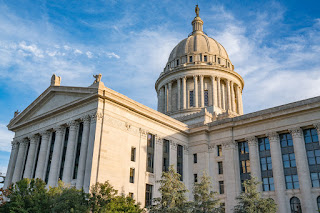Thursday, April 10, 2025
Thursday, February 20, 2025
Storm chasing license bill advances through Senate committee
Both legislative bills seeking to create a professional storm chasing license and extend certain 'first responder' privileges have now passed their first committee votes (the House version, HB 2426, passed in committee on Feb. 4th, and advanced to another committee). It's extremely unpopular among the storm chasing community, as they feel - among other things - that it's one step toward regulating all storm chasing activities (and puts the government thumb on the scale for some members in an unfair advantage and unsafe manner).
| Sen. Mark Mann (D-OKC) and Rep. Scott Fetgatter (R-Okmulgee) |
OKLAHOMA CITY (Feb. 20th) – Sen. Mark Mann, D-Oklahoma City, won unanimous, bipartisan support from the Senate Retirement and Government Resources Committee for legislation to help storm trackers travel Oklahoma roads and highways more safely during severe weather. Senate Bill 158 would allow storm trackers employed by FCC licensed radio or TV stations or employees from universities with meteorology programs to be able to travel as first-responders.
Saturday, February 08, 2025
Reactions to Oklahoma storm chasing license bill passing first State House committee vote
OKLAHOMA CITY (Feb. 6th) – Rep. Scott Fetgatter, R-Okmulgee, on Tuesday passed a bill in committee that would allow professional storm chasers to obtain licensing through the state that will allow them special accommodations while they are tracking severe weather.
Friday, January 31, 2025
Storm chaser licensing and regulation? These legislators want to see it happen.
State Sen. Mark Mann (D-OKC) and State Rep. Scott Fetgatter (R-Okmulgee) are the authors of Senate Bill 158 and House Bill 2426, the Oklahoma Emergency Weather Response and Tracking Regulatory Act, which aims to create a licensure and regulatory framework for professional storm chasers in Oklahoma.
Specifically, the measure would create a 'professional severe weather tracker' license for individuals specifically contracting with either television stations or Oklahoma colleges or universities. The license would cost $500, with a $250 annual fee, in addition to requirements for insurance.
Saturday, January 21, 2023
OCPA column: Fiscal crisis can prompt good policy
Oklahomans may live far removed from Washington, D.C., but that doesn’t mean the negative repercussions of bad federal policy are not felt by families in all parts of the state. Out-of-control federal spending and government overreach has fueled constant tax increase attempts, historic inflation and widespread hardship.
But one of the few upsides to the federal fiscal crisis is that is has prompted good policy responses at the state level.
Sunday, November 06, 2022
OCPA column: State’s licensure boards declared a “time bomb”
State licensure boards are an important, although often overlooked, component of job opportunity and economic growth. The boards control access to professions. If operated appropriately, they provide consumer protection while allowing the most qualified people possible to enter a profession, which increases competition and keeps prices down for consumers.
But there’s reason to worry Oklahoma’s licensure boards have inherent flaws that not only stymie healthy industry competition, but also could be found illegal. One legislator compared the state’s licensure system to “sitting on a time bomb.”
Friday, March 04, 2022
Small: Setting Oklahoma on path to post-pandemic growth
COVID rates have plunged in the past month and the worst may be behind us. Now policymakers should adopt significant reforms to allow Oklahoma to grow and thrive in the pandemic’s aftermath.
At the Oklahoma Council of Public Affairs, we’ve released a new study that provides a blueprint. It has three major planks: eliminate the personal income tax, reform our state’s dysfunctional regulatory system, and put parents in charge of education with a universal Education Savings Account.
When it comes to taxation, the old adage holds true: If you want less of something, tax it more. Given that the income tax is a penalty on earnings—from work, investment, and risk taking—that means our state discourages job growth with the income tax. It doesn’t have to be that way.
If policymakers reduce Oklahoma’s income tax to zero and offset that change by broadening the sales tax and making sales tax rate adjustments (if policymakers want a revenue-neutral reform), our estimates show those changes would rapidly increase the state’s GDP by almost 3% and have a positive GDP growth impact of around a quarter-percent per year. Over 10 years’ time, Oklahoma’s GDP would increase by more than $13 billion, or more than 100,000 jobs.
Thursday, February 24, 2022
State Senate passes bill to help job-seekers with criminal records
Senate approves occupational licensing reform
OKLAHOMA CITY – The Senate has given approval to Senate Bill 1691, which builds upon previously passed occupational licensing reforms and would be transformational for job-seeking Oklahomans with criminal records to seize their second chance.
The measure, authored by Sen. Zack Taylor, R-Seminole, adds to current state law on occupational licensure so a criminal record could only be grounds for license denial if the offense substantially relates to the duties and responsibilities of the occupation and poses a reasonable threat to public safety. Each licensing board would be required to consider the seriousness of the crime, amount of time that’s passed since conviction, the age of the applicant at the time the crime was committed, evidence relevant to the offense and evidence of rehabilitation.













